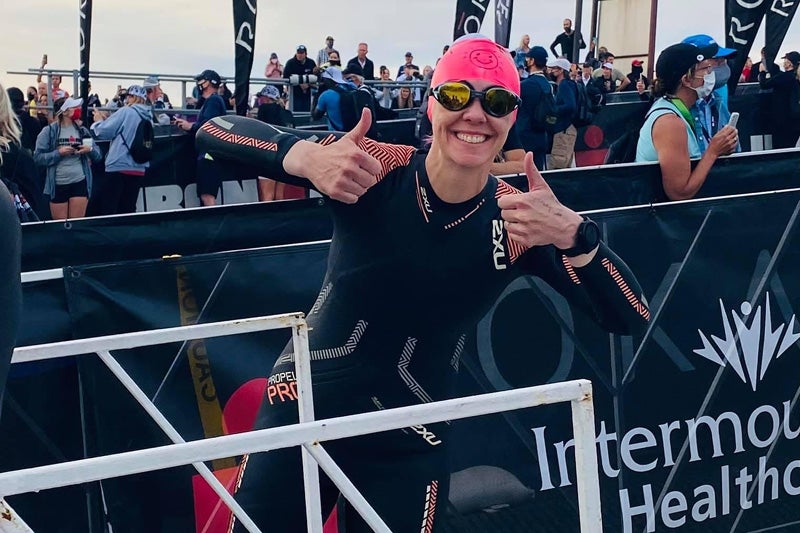Young, competitive athlete healthy now after stroke
June 18, 2025Categories: Stroke Patient Stories, Neurosciences Patient Stories

After running a 5K in her hometown of Dallas Center, Ashley Wilkinson’s mom and friend suddenly asked her if she was feeling OK. Ashley, 39 at the time, didn’t realize she was slurring her words and drooling. It was clear she was having a stroke.
“I’d come home from Colorado where I’ve lived for 16 years for my class reunion and the 150th anniversary celebration of Dallas Center. Thankfully, the anniversary parade had just ended, so there were several paramedics in the area.” said Ashley of that day, August 24, 2019.
Hometown advantage
After her mom called 911, the Dallas Center paramedics arrived on the scene in just a few minutes. Ashley was sitting on the ground and losing function of her left side. The speed of her care made all the difference to her recovery.
The ambulance driver, a high school classmate of Ashley’s, asked where they wanted to go, and Ashley’s mother said, “MercyOne Des Moines.” This was a welcome response, as the driver said, “Good, because they have a stroke center there.” The paramedics called ahead and once Ashley was at the Emergency Department, she was given Tissue Plasminogen Activator (TPA), but it didn’t work. After scanning her brain, Alan McDaniel, MD found a clot and made a plan to remove it.
Ashley said, “It was all kind of a blur, but I wasn’t scared or worried for some reason. I just thought, ‘They got this.’” Once they got her to the MercyOne Des Moines Stroke Center and ready for surgery, a thrombectomy was performed, as a catheter was inserted into Ashley’s brain, which she remembers clearly, “It was like I had the worst headache of my life, but cognitively, I was OK. All function began to return, and I said, ‘Look, I can move my left hand!’ They said, ‘Hold on! We’re still in your brain!’” It should be noted that the MercyOne Des Moines Stroke Center is the only hospital in Des Moines that performs the thrombectomy procedure.
Road to recovery
Surgeons removed the clot, and by the end of the day, Ashley passed her speech and fine motor skills test. Then, her doctors got to the bottom of why she had a stroke.
Ashley found out in 2017 she was born with a patent foramen ovale (PFO), a small hole between the two upper chambers of the heart that doesn’t close after birth and increases the risk of stroke. Prior to her PFO diagnosis, she had several ocular migraines and one instance where she lost the function of her left hand. After seeing a neurologist and cardiologist, she found out she had an undiagnosed Transient Ischemic Attack (TIA). “It had been diagnosed as an irregular migraine,” Ashley said. Many people have a PFO and may never know or be affected. She needed to have a patch inserted to close the hole.
Ashley said, “Dr. Mark Tannebaum’s assistant was a friend of mine from high school and told him about my situation. He came home early from vacation to complete my heart procedure on August 29, and I was home on August 30. By then, all signs of the stroke were gone, but I had to take it easy for about a month.”
Returning to the races
Taking it easy is not generally Ashley’s way of life. She’s married, has two children and is a massage therapist, cycling coach and competitive athlete.
“I did my first IRONMAN 70.3 in 2012, and since then I've completed six full distance IRONMAN races and 22 half IRONMANs, plus several other shorter races.” Ashley didn’t compete in any Ironman races after her stroke until 2021, when she did a half IRONMAN in St. George, Utah. “I was a little nervous about the heat during the race, so I made sure to stay hydrated, enjoy the day and celebrate how far I’d come,” Ashley said. She did well, finishing in seven hours on a very challenging course. Since then, Ashley has completed three full IRONMANs and six half IRONMANs. Her husband, Scott, and children, Will and Maddie, cheer her on and support her goals.
“Just because you are young and healthy doesn't mean you can’t have a stroke,” Ashley said. “It’s a weird place, because you have to accept what has happened, but it’s very frustrating because you want to be the way you were before. You have to be patient with the recovery, and it may take longer than you think to get back to the activities you enjoy. I waited until I knew my brain, body and emotions could handle it.”
Good care means everything
Even though she has always had a healthy diet, Ashley did make one significant change, “I eat a lot less red meat than I did before. Being from Iowa, it was a staple in my diet, but I watch it more carefully now.”
Ashley said her care at MercyOne was exceptional, “I’m really happy with the care I received. Any concerns I had, they addressed them, and everyone was so skilled and competent. I felt solid and confident about the care I was receiving.”
